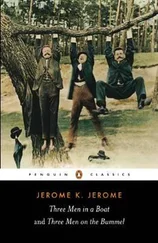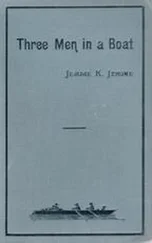For clothes, George said two suits of flannel would be sufficient, as we could wash them ourselves, in the river, when they got dirty. We asked him if he had ever tried washing flannels in the river, and he replied: “No, not exactly himself like; but he knew some fellows who had, and it was easy enough;” and Harris and I were weak enough to fancy he knew what he was talking about, and that three respectable young men, without position or influence, and with no experience in washing, could really clean their own shirts and trousers in the river Thames with a bit of soap.
We were to learn in the days to come, when it was too late, that George was a miserable impostor, who could evidently have known nothing whatever about the matter. If you had seen these clothes after—but, as the shilling shockers say, we anticipate.
George impressed upon us to take a change of under-things and plenty of socks, in case we got upset and wanted a change; also plenty of handkerchiefs, as they would do to wipe things, and a pair of leather boots as well as our boating shoes, as we should want them if we got upset.
The food question.—Objections to paraffine oil as an atmosphere.—Advantages of cheese as a travelling companion.—A married woman deserts her home.—Further provision for getting upset.—I pack.—Cussedness of tooth-brushes.—George and Harris pack.—Awful behaviour of Montmorency.—We retire to rest.
Then we discussed the food question. George said:
“Begin with breakfast.” (George is so practical.) “Now for breakfast we shall want a frying-pan”—(Harris said it was indigestible; but we merely urged him not to be an ass, and George went on)—“a tea-pot and a kettle, and a methylated spirit stove.”
“No oil,” said George, with a significant look; and Harris and I agreed.
We had taken up an oil-stove once, but “never again.” It had been like living in an oil-shop that week. It oozed. I never saw such a thing as paraffine oil is to ooze. We kept it in the nose of the boat, and, from there, it oozed down to the rudder, impregnating the whole boat and everything in it on its way, and it oozed over the river, and saturated the scenery and spoilt the atmosphere. Sometimes a westerly oily wind blew, and at other times an easterly oily wind, and sometimes it blew a northerly oily wind, and maybe a southerly oily wind; but whether it came from the Arctic snows, or was raised in the waste of the desert sands, it came alike to us laden with the fragrance of paraffine oil.
And that oil oozed up and ruined the sunset; and as for the moonbeams, they positively reeked of paraffine.
We tried to get away from it at Marlow. We left the boat by the bridge, and took a walk through the town to escape it, but it followed us. The whole town was full of oil. We passed through the church-yard, and it seemed as if the people had been buried in oil. The High Street stunk of oil; we wondered how people could live in it. And we walked miles upon miles out Birmingham way; but it was no use, the country was steeped in oil.
At the end of that trip we met together at midnight in a lonely field, under a blasted oak, and took an awful oath (we had been swearing for a whole week about the thing in an ordinary, middle-class way, but this was a swell affair)—an awful oath never to take paraffine oil with us in a boat again-except, of course, in case of sickness.
Therefore, in the present instance, we confined ourselves to methylated spirit. Even that is bad enough. You get methylated pie and methylated cake. But methylated spirit is more wholesome when taken into the system in large quantities than paraffine oil.
For other breakfast things, George suggested eggs and bacon, which were easy to cook, cold meat, tea, bread and butter, and jam. For lunch, he said, we could have biscuits, cold meat, bread and butter, and jam—but no cheese . Cheese, like oil, makes too much of itself. It wants the whole boat to itself. It goes through the hamper, and gives a cheesy flavour to everything else there. You can’t tell whether you are eating apple-pie or German sausage, or strawberries and cream. It all seems cheese. There is too much odour about cheese.
I remember a friend of mine, buying a couple of cheeses at Liverpool. Splendid cheeses they were, ripe and mellow, and with a two hundred horse-power scent about them that might have been warranted to carry three miles, and knock a man over at two hundred yards. I was in Liverpool at the time, and my friend said that if I didn’t mind he would get me to take them back with me to London, as he should not be coming up for a day or two himself, and he did not think the cheeses ought to be kept much longer.
“Oh, with pleasure, dear boy,” I replied, “with pleasure.”
I called for the cheeses, and took them away in a cab. It was a ramshackle affair, dragged along by a knock-kneed, broken-winded somnambulist, which his owner, in a moment of enthusiasm, during conversation, referred to as a horse. I put the cheeses on the top, and we started off at a shamble that would have done credit to the swiftest steam-roller ever built, and all went merry as a funeral bell, until we turned the corner. There, the wind carried a whiff from the cheeses full on to our steed. It woke him up, and, with a snort of terror, he dashed off at three miles an hour. The wind still blew in his direction, and before we reached the end of the street he was laying himself out at the rate of nearly four miles an hour, leaving the cripples and stout old ladies simply nowhere.
It took two porters as well as the driver to hold him in at the station; and I do not think they would have done it, even then, had not one of the men had the presence of mind to put a handkerchief over his nose, and to light a bit of brown paper.
I took my ticket, and marched proudly up the platform, with my cheeses, the people falling back respectfully on either side. The train was crowded, and I had to get into a carriage where there were already seven other people. One crusty old gentleman objected, but I got in, notwithstanding; and, putting my cheeses upon the rack, squeezed down with a pleasant smile, and said it was a warm day.
A few moments passed, and then the old gentleman began to fidget.
“Very close in here,” he said.
“Quite oppressive,” said the man next him.
And then they both began sniffing, and, at the third sniff, they caught it right on the chest, and rose up without another word and went out. And then a stout lady got up, and said it was disgraceful that a respectable married woman should be harried about in this way, and gathered up a bag and eight parcels and went. The remaining four passengers sat on for a while, until a solemn-looking man in the corner, who, from his dress and general appearance, seemed to belong to the undertaker class, said it put him in mind of dead baby; and the other three passengers tried to get out of the door at the same time, and hurt themselves.
I smiled at the black gentleman, and said I thought we were going to have the carriage to ourselves; and he laughed pleasantly, and said that some people made such a fuss over a little thing. But even he grew strangely depressed after we had started, and so, when we reached Crewe, I asked him to come and have a drink. He accepted, and we forced our way into the buffet, where we yelled, and stamped, and waved our umbrellas for a quarter of an hour; and then a young lady came, and asked us if we wanted anything.
“What’s yours?” I said, turning to my friend.
“I’ll have half-a-crown’s worth of brandy, neat, if you please, miss,” he responded.
And he went off quietly after he had drunk it and got into another carriage, which I thought mean.
From Crewe I had the compartment to myself, though the train was crowded. As we drew up at the different stations, the people, seeing my empty carriage, would rush for it. “Here y’ are, Maria; come along, plenty of room.” “All right, Tom; we’ll get in here,” they would shout. And they would run along, carrying heavy bags, and fight round the door to get in first. And one would open the door and mount the steps, and stagger back into the arms of the man behind him; and they would all come and have a sniff, and then droop off and squeeze into other carriages, or pay the difference and go first.
Читать дальше











